Genre: Adventure Developer: KCE Japan Publisher: Konami Players: 1 Released: 1996
“They’re Police. They’re Astronauts. They’re the Policenauts.”
In the early 1990s, noted video game creator Hideo Kojima set out on creating another cinematically-inspired text adventure akin to the point-and-click games that dominated 1990s personal computers. While not as cyberpunk as its predecessor, Kojima would follow-up Sega CD cult classic Snatcher with a sci-fi buddy cop adventure that today is more known for the use of its pixel art in vaporwave motifs on YouTube than anything else. But more than strictly an aesthetic experience, Kojima’s unique directing prowess drives Policenauts to blend everything this game’s target audiences of geeks would enjoy: Cowboy Bebop-esque anime art styles, dystopian futuristic societies filled with technical jargon, giant mechs, gun battles, and blatant rip-offs of American Hollywood movies into a uniquely Japanese interactive adventure.
Policenauts, like Snatcher, had numerous re-releases on PCs and consoles throughout its span of relevance. First released for the NEC PC-98 computer in 1994, Policenauts would see a Sega Saturn release in Japan in September of 1996. Featuring full cinematic anime cut scenes replacing the pixel art of the PC-98 release, as well as new scenes, new music, and even more excessive amounts of dialogue for curious players to sift through, the Saturn version is considered the definitive release of the game. According to Hardcore Gaming 101, Policenauts was announced for an English release on the Sega Saturn, but for unclear reasons was cancelled. Thankfully, due to the efforts of the team at Policenauts.net, a fully-translated English version of the Saturn release was finally completed in 2016.
Since 90% of Policenauts is its story, the game must mainly be judged on the story’s merits. Set in the year 2040, Policenauts has the player act as private detective Jonathan Ingram, a former police officer from “Old L.A” who was once part of the prestigious group of “Policenauts,” a group of five officers who were sent to space for an expedition that would later found the first space colony for humans, called BEYOND. The first of many homages to American movies in the game, Jonathan bears a striking resemblance to Mel Gibson’s character from Lethal Weapon.
During the inaugural mission however, Jonathan gets accidentally cut loose from his spaceship, drifting off into the deep space abyss. Believed to be lost forever, this buddy cop adventure starts off like folk tales Rip Van Winkle and Urashima Taro as Jonathan returns to Earth, now called HOME. Thanks to surprisingly advanced technology in his spacesuit that allowed him to hibernate and subsequently, not age. The only problem is that everything and everyone around him has become 25 years older.
His hometown of Los Angeles is now a mess that seems lifted straight from the movie Blade Runner, and his wife Lorraine has left him for another man. Jonathan starts a fledgling detective agency to get back on his feet, to little success. When Lorraine mysteriously shows up at Jonathan’s office seeking his help to find her second husband who has disappeared, the story kicks into high gear. After a tragic moment, Jonathan takes up the case and travels to the BEYOND colony to find answers. He teams up with his former teammate, disgraced vice squad officer Ed Brown, who these days is relegated to desk duty. Ed also looks uncannily similar to Danny Glover, further pushing the Lethal Weapon inspiration. To top it off, he has an issue with firing his gun, just like Officer Al Powell from Die Hard.
Kojima is unapologetic about lifting of major plot points and visual motifs from his favorite American movies to use in his games, but much like Snatcher, which took blatant cues from Blade Runner, Terminator, and Alien; the blend of American plot points however surprisingly does not distract from the overall motif of Policenauts. Unlike the creative writing story that we all had to write in ninth grade that borrowed and stole from our favorite shows and movies, Policenauts feels familiar without feeling derivative. One also cannot overlook the well-designed characters that makes it a memorable game. Each character dons unique clothes, hairstyles, and facial features that make them stand out from your average character actor. Jonathan’s “Varsity jacket with red collared shirt” and blue hair look is what makes him the darling for avatars and signatures on bulletin boards and social media platforms throughout the internet. Video game characters don’t generally ooze cool, but the ones in Policenauts do.
If anything, the main critique for Policenauts is that the plot is almost too straightforward. Since Kojima relies on tried and true tropes throughout the game, there aren’t as many plot twists or “Keep you guessing” moments in Policenauts, instead focusing on high energy action sequences. Included to flesh out the gameplay are fabulous animated shootout sequences, continuing on Kojima’s addition to Snatcher. But where Snatcher’s shootouts were stiff, boring events that felt shoved into the game at the last moment, Policenauts’ sequences are exciting and varied. You’ll participate in a car chase scene that seems lifted straight from Miami Vice, and a shootout towards the end of the game that defies the imagination and pokes fun at the strength of buddy cop movie protagonists. The pinnacle of gameplay in Policenauts is a unique bomb-defusing sequence that has all of the tension and difficulty of a real-life situation, but with some “break the fourth wall” humor that is experienced when you fail to defuse the bomb in a timely manner.
Where Policenauts shines most though, is in its deep introspective look at each character in the game through their environment, a feature that can be only achieved through the text adventure format. The opening scene of the game where Jonathan looks over his office, cluttered with moments of a past, fantastic life, is vintage space-age existentialism that made the anime Cowboy Bebop a true classic. Rather than pushing the game solely through dialogue or visual action, Kojima and company allow the player to experience the fullness of the story by dillydallying on pictures and other obscure objects in the background. His eye for detail in his own universe opens up the characters to the player in a way that the average buddy-cop movie cannot, giving the player a truly immersive science fiction experience.
Regarding Policenauts’ interface, the game strikes me as one of the more polished point-and-click adventures released, if still including some of the limitations of the genre. A cursor is provided for the player to move around and explore the scene in front of them, clicking on anything and everything, which then brings up potential actions by the player. While this approach may seem commonplace and banal 25 years later, anyone who is familiar with other games of the genre knows that an included cursor for the player allows for pinpoint accuracy that keeps the player from being forced to try vague “Look” and “Talk” actions in front of them over and over again seeking different results to move the story. Remember, this was released a mere two years after Windows 3.1!
The game has more than a few awkward moments though. Where Policenauts takes from the best of American cinema, it also takes from some of the worst of Japanese culture. Throughout the game, Jonathan makes tons of awkward comments hitting on women. And to top it off, an absurd and disturbing “feature” in Policenauts allows the player after numerous repeated “risky” clicks on the chests of unsuspecting characters, to grope each and every woman you come across with no consequence. While the average American player can easily get through the game having never discovered this ability to sexually harass NPCs, (I myself didn’t know this was in the game until I researched online after my own playthrough), it is easy to hypothesize that this was the main reason why the game never came over the United States. A player has to wonder why it was included in the game in the first place, if it serves only as a terrible reflection of the Japanese culture of sexuality, known mainly for its pervasive acceptance of pornography, lack of young people having sex, and “Lost Generation” young men who don’t leave their rooms. Sadly, there’s no correlating scene that sends Jonathan to jail after attempting this too many times.
Overall, Policenauts is a worthy successor to Snatcher and one of the most expensive text adventure offerings that has been released for any console, classic or modern. While the modern American audience may find the game offensive or a little too close to copyright infringement at times, it is undoubtedly one of the first games that gave the video game format the ability to look, feel, and tell a story that is just as compelling as any big budget Hollywood film. Storytelling of this magnitude wouldn’t be seen for another ten years with the release of the first Phoenix Wright game for the Nintendo DS and GBA. For that alone, Policenauts should definitely be considered a worthy candidate for playthrough. Just uh… leave the women alone when you play it.
SCORE: 7 out of 10

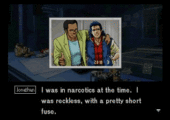
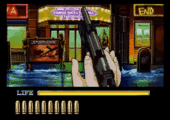
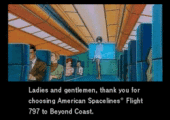
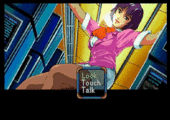
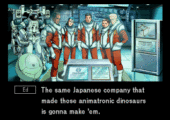
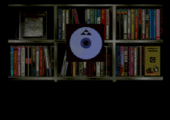
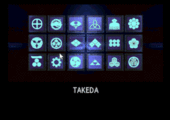
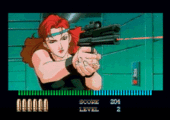

Recent Comments